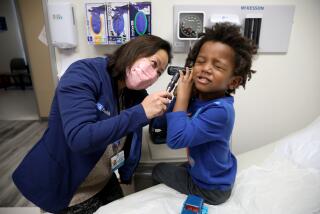Coalition Sets Sights on Workers Without Healthcare Insurance
Sabino Salazar does not have health insurance, but he has a wife and three children.
Yet everywhere that Salazar, 39, a garment worker, turned Saturday at a health fair in downtown Los Angeles, he encountered variations on the same morbid message: Without insurance, something bad will almost certainly happen.
The fair was part of âCover the Uninsured Week,â a media blitz by 80 organizations pushing for increased healthcare coverage. About 44 million Americans and 6 million Californians have no health insurance, according to the coalition, which includes the Robert Wood Johnson Foundation and the California Endowment.
Salazar is the kind of person the coalition wants to get covered. The Los Angeles resident arrived in the United States from Mexico two years ago and was hired as a supervisor at American Apparel -- a downtown company that offers its employees health benefits.
But he has preferred to pay cash for care at community clinics. âI worry about it; if something happens, then what?â he said.
Experts have for years tried to understand the impact of the uninsured on modern healthcare. Some problems frequently raised include more crowded emergency rooms and more expensive care for those with coverage -- to help providers pay for those without insurance.
In addition, one recent Institute of Medicine study concluded that 18,000 adults die prematurely each year because they do not receive preventive care due to a lack of insurance.
âThere has been a relative lack of ideas on what to do. Everyone appears to agree that the problem is tremendous, but the consensus falls apart pretty quickly on solutions,â Dr. Robert K. Ross, president and chief executive of the California Endowment, said.
But the conundrum for politicians in recent years is figuring out who should pay for expanding coverage.
There will be a state proposition on the November ballot seeking to overturn a 2003 law that requires small-business owners to purchase healthcare coverage for more employees. That law, however, has yet to be enacted.
Many small-business owners argue that having to subsidize employee health plans could put them out of business.
Gerald Kominski, associate director of the UCLA Center for Health Policy Research, said one idea he and his colleagues are studying is to take state and federal money that now goes to hospitals to pay for care of the uninsured and instead use it to help purchase insurance for those without coverage.
âThere would be individuals walking in the hospital door with insurance policiesâ rather than without any insurance at all, Kominski said. âDoing this should have relatively little or no effect on hospital revenue.â
Kominski said itâs uncertain how hospitals might react to that proposal -- particularly public hospitals that usually end up taking care of the uninsured who are the most seriously ill.
Dr. Susan Fleischman, medical director of the Venice Family Clinic, agreed it would be better to get people insured before thereâs a problem. âIn this country we donât let an uninsured child die of asthma in the emergency room -- weâre going to pay for it -- so wouldnât it make sense to pay for it earlier?â she said.
The health fair was held between American Apparelâs giant warehouses. Most of those in attendance work for the firm, one of the few garment factories in Los Angeles to offer health plans and help employees enroll in state programs such as Healthy Families or Medi-Cal.
The challenge is persuading people to sign up, said Daniel Castellon, the firmâs occupational health coordinator. Nearly all of the companyâs employees are recent immigrants from Central and South America, and some are still reluctant to lose a few dollars from their paychecks for coverage in case something bad happens.
Many others, however, are realizing that itâs better to have a safety net.
âOne of the benefits for them is they get health insurance and stay healthy,â Castellon said. âFor us, the benefit is we keep employees.â
More to Read
Sign up for Essential California
The most important California stories and recommendations in your inbox every morning.
You may occasionally receive promotional content from the Los Angeles Times.










